As Australia pauses to reflect on ANZAC Day, we speak to Invictus Games champion Dave Miln, second in command at the ADF Diving School; former sailor and Navy reservist Carly Bakes who is passionate about serving; and Legacy Northern Beaches which supports the families of those who died or were injured while serving in the Australian Defence Force.
Carly Bakes: Former sailor and Navy reservist
ANZAC Day is a time of reflection for reservist Carly Bates, who spent eight years as a sailor in the Royal Australian Navy, participating in operations in the Solomon Islands and Egypt. Her service brought her adventure, mateship and a great respect for those who had gone before her.
“I have a deep sense of pride in being part of something that has been so great for our nation,” Carly, 30, says. “I look at my peers who have 20 or 40-year careers in defence and I am extremely honoured to know them. I’m very proud of them and I think we should continue to reflect on the stories of those people that have served.”
Carly joined the Navy fresh out of high school at 18. “I just wanted to be part of it,” she recalls. “I was always very passionate about serving.” After taking a role as a logistics and supply chain sailor in 2012, she was sent to HMAS Cerberus in Victoria to undertake 12 weeks of training.
There, she found herself amongst a group of 70 personnel, with about 20 of them women. “The women that were there, we just rallied around each other. We were doing everything that we needed to do and more. The men were super supportive as well. It wasn’t like we didn’t ever feel like we couldn’t do what the men could do,” she says.
“One of the ladies, one of the oldest people in our division, could do more push-ups than all the men – and they (the men) were 18!”
It was ‘very mentally and physically tough,’ but Carly says it was equally rewarding. “I was proud to get through it.”
Her role saw Carly ensuring that all the departments on board the vessel, like engineering and aviation, were able to get the parts they needed to do their jobs. This could include the supply of mechanical parts, weaponry and everything in between. Her second or ‘auxiliary role,’ was as part of the ship’s medical emergency team, supporting the medics onboard every two to three days.
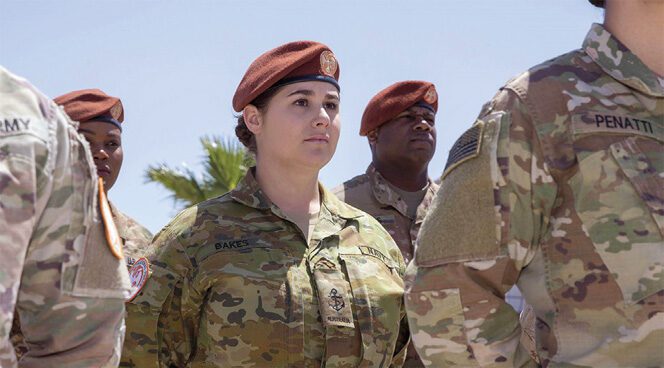
Carly on parade at Operation Mazurka, 2019

In training
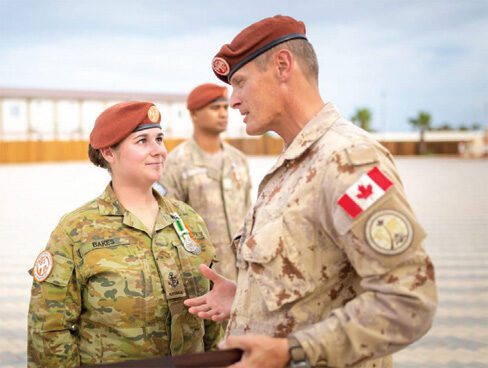
On Operation Mazurka
She spent time in the Solomon Islands with Operation Render Safe on a 2016 deployment. It was a multinational operation which found and destroyed more than 10 tonnes of World War II munitions, including bombs, mortars and bullets.
“It was personally very rewarding, particularly when I could go and speak to locals in the community,” Carly says. “Building strong relationships in that region was very gratifying.”
A 2019 deployment to Egypt with Operation Mazurka was also a highlight, with Carly part of the Multinational Force and Observers (MFO) in Sinai, overseeing the long-standing peace agreement between Egypt and Israel.
Carly was a leading seaman when she left the Navy in 2020, and while she is still on the Navy Reserves roll, she has a full-time job as an industry engagement officer for Birdon, working to provide Australian businesses with opportunities to work on for defence projects.
She encourages other women to consider a career with the Australian Defence Force. “It certainly was challenging and it will put you through your paces physically and mentally at times, but I have no regrets in doing what I did. Some of the strongest friendships I’ve formed in my own life have come out of being in the defence and in the Navy.”
This ANZAC Day, Carly will be attending the march in the city as usual, and head to the Royal Automobile Club of Australia afterwards to catch up with older veterans.
“I find they just want to tell their story and I’m more than happy to be the person to hear that story – it’s so important,” Carly says.
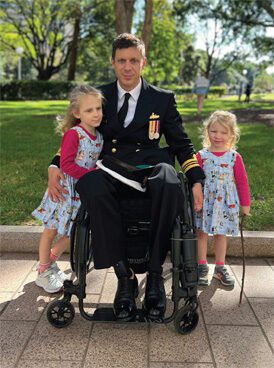
David with his daughters Isla and Anna at an ANZAC Day service
Dave Miln: Invictus Games champion
By Aoife Moynihan
Navy diver David Miln could have sunk to the depths of depression when he lost both legs in a tragic snow accident in northern California in December 2022. Instead, he turned his tragedy into gold and silver medals at this year’s Invictus Games.
Dave now serves as a second in command at the Australian Defence Force Diving School at HMAS Penguin in Balmoral. It’s been a long road back for the Warriewood local since his legs were amputated in late 2022.
The former Australian Navy clearance diving officer, 39, was on exchange in San Diego when he took a ski holiday in California with his wife Clare and young daughters Anna and Isla (one and three years at the time).
Their family holiday took a tragic turn on the first morning when Dave got trapped in a snow removal machine, along with his young daughters.
“It’s like a combine harvester – it’s got a big six-foot circular blade at the front for clearing large snow drifts from roads and paths,” Dave says. “We were coming down a ski-in/ski-out track to get to the slopes and came around a 90-degree corner. It was right in front of us. There was no way to avoid it.
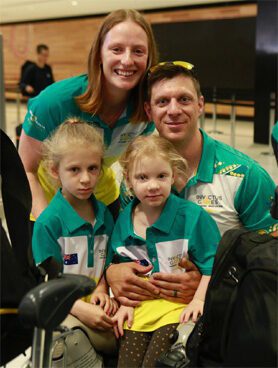
The Miln family arriving in Canada for the Games
“I was on skis, had Isla on skis between my legs and Anna on skis on my hip. Clare was on skis two meters behind.”
“I slipped and slid into the machine,” says Dave, whose swift actions saved his daughters’ lives as they were pulled into the machine. “I put my left leg over my eldest and rolled my body onto my youngest. It took my left leg off above the knee and crushed my right leg as I went in.
“Then I did a rotation between the blades with my daughters. When I came back down, I was pinned to the ground by my hips. I had broken my pelvis into four places and fractured six vertebrae.
“It also broke Isla’s right tibia, left femur and pelvis – Anna came out without a scratch.”
Dave said he might have died was it not for the swift action of his ‘amazing’ wife Clare, who watched in horror as the accident unfolded right in front of her.
“She watched all of us go into the machine and thought, ‘it’s all over.’ But then she heard one of the girls scream, and it kicked her into parental overdrive. She focused and went to work, putting the first tourniquet on me and getting the emergency services sorted,” says Dave.
After spending 17 days in intensive care in the USA, he was flown to Sydney for another two months at Royal North Shore Hospital, received prosthetic legs, and was discharged to rehabilitation, eventually returning to the family home in April 2023.
While in hospital, an Invictus coach sparked Dave’s interest in the Games. Invictus Australia uses sport to help veterans with rehabilitation, recovery and integration back into civilian life.
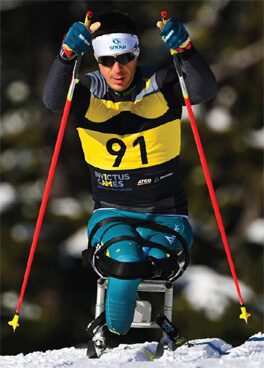
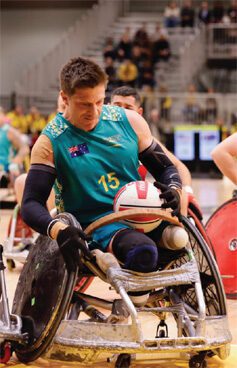
Dave served with the Royal Marines in the UK, where he grew up before moving to Sydney in 2019. He had always loved sport, and post-accident he started swimming, joined a wheelchair basketball club in Manly, and began cross- country skiing and biathlon.
After watching the Aussie team training at the Sydney Academy of Sport in Narrabeen ahead of the 2023 Invictus Games, he applied for the 2025 event. He went on to compete in Biathlon, Nordic skiing, swimming and wheelchair rugby, winning four gold and two silver medals at the Invictus Games in Canada last February.
Being in the snow for the first time after the accident was a challenge. “It was our first time back at the snow as a family which was hard,” says Dave. “But hopefully, long term, it will keep us going in a good direction as we try and come to terms with things.”
In the two years since his accident, Dave has competed in the Warrior Games in the USA (American Defence Forces’ version of Invictus), was selected to join the Aussie Para Triathlon team ahead of the World Triathlon Para Series in Tasmania in March, and Oceania Triathlon on the Gold Coast in May. He also made Paralympics Australia’s long list for the 2026 Winter Games.
His training schedule is ‘pretty chaotic’ with about 10 to 15 hours spent in sessions throughout the week, but he keeps Sundays free for precious family time.
It’s been a tough road for Dave and his family and he is constantly inspired by Clare and his daughters, especially his eldest, Isla, six, who has endured over 15 surgeries following the horrific accident.
“She had to learn to walk again three times,” says Dave. “But her resilience and cheerfulness always inspires me to keep going to be the best possible version of myself that I can be.”
Dave is seeking funding for the 2026 Paralympic Winter Games and would love community support. Visit asf.org.au/ projects/dave-miln
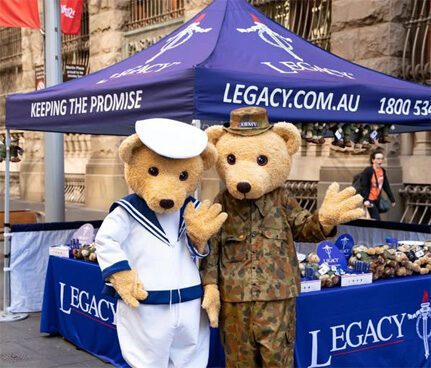
Legacy Northern Beaches
By Aoife Moynihan
Many of those who served Australia in war never made it home to their families, while others returned with physical injuries and were mentally scarred. Legacy was established in 1923 by a small group of World War I veterans on a promise from one digger to another to ‘look after the missus and the kids.’
Over 100 years later, the Legacy promise is upheld through 44 active Legacy clubs around Australia, which provide emotional, social, and financial support to over 34,000 widows, children, and dependents of those who died or were injured while serving in the Australian Defence Force (ADF). Legacy is supported by more than 3,000 volunteers, known as legatees.
Legacy Northern Beaches (LNB) has 12 legatees caring for about 500 war widows and 35 beneficiaries with physical or mental difficulties.
LNB helps war widows navigate issues like My Aged Care, provides transport assistance, and offers advice on other issues.
Barry Nolan, LNB chairman, says he sees a lot of younger windows from the wars in Iraq, Afghanistan, Somalia, and, more recently, many as a result of the Vietnam War. He says the enrolment procedure can be quite a moving experience, at a time when a widow’s pain can often be very raw soon after losing their partner.
“They’ve already gone through that dissociation because the veteran’s been serving,” Barry says. “But when the veteran dies, they’ve lost their soulmate.”
Regular social events also provide an opportunity for widows, who might be lovely and vulnerable, to connect with others who have shared experiences.
“The main purpose of coffee clubs and lunches is for the ladies to get together, chat and form friendships,” says Barry. “We’re here to provide any information they require or help them with any problems that they’re having.”
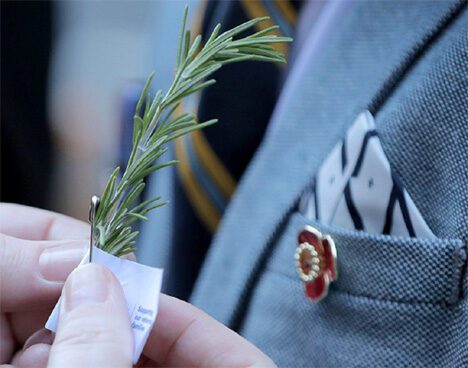
The support extends to the children of veterans – young children receive a pocket money allowance. Legacy also assists with university fees, and Barry says they keep an ongoing watchful eye over the children as they become independent.
Barry served in the Army for many years before retiring in 1996.
“I answered the bugle call in the early sixties in Darwin,” he recalls. “Where it was thought Indonesia was going to invade Australia. I joined the Army Reserve, 4076 Squadron, went into officer training in 1966 and was commissioned in 1968.”
Barry served in a variety of roles with the 17 Battalion, but wasn’t deployed to Vietnam. He says he was too old at 28, but he is thankful because many of his friends who fought in Vietnam returned as ‘broken men.’
On ANZAC Day, he says Legacy will hand out rosemary twigs at the Dawn Services in Manly Dam and Dee Why Beach.
“Rosemary grows in Gallipoli, and in ancient times, it was meant for remembrance,” Barry explains.
LNB needs volunteers, including ANZAC Day, as the number of activities and support services increases. Funding is primarily through donations, for which they are always grateful, regardless of the size.
Help honour our veterans and help Legacy ensure that no family is left alone in their time of need by attending an ANZAC Day service and making a donation.
ANZAC DAY SERVICES
North Sydney War Memorial
Sunday 13 April | 10am
Kirribilli RSL Sub-branch
Friday 25 April | 5.45am
North Sydney RSL Sub-branch dawn service
Willoughby Park
Friday 25 April | 7am
Willoughby Legion Ex-services Club commemorative service
Georges Heights Parade Ground
Friday 25 April | 5.30am
Mosman RSL Sub-branch dawn service








